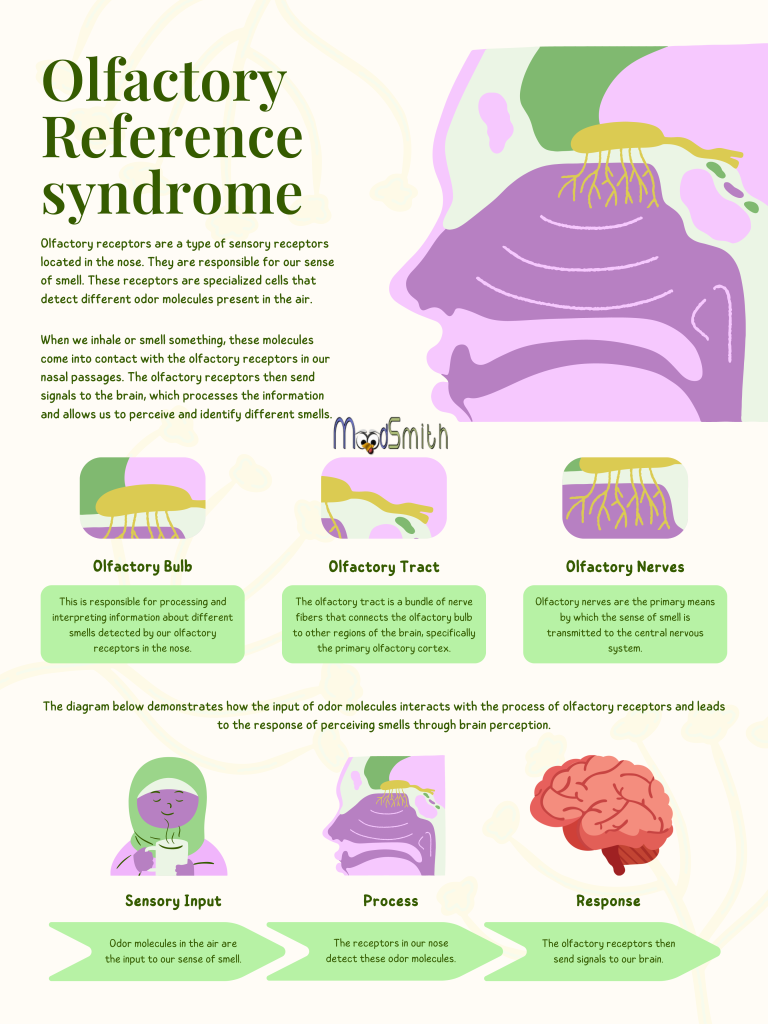Olfactory reference syndrome (ORS) is a lesser-known mental health condition where you falsely believe that there is an odour coming from you. This belief can seriously affect your life, leading to social isolation, excessive showering, distress and extreme anxiety around others. Even though MoodSmith is predominately about obsessive-compulsive disorder (OCD), I decided to write about ORS as it shares many characteristics of OCD and thought it would be helpful to write a brief article explaining what it is.

Symptoms
When I discuss the symptoms, you can see how olfactory reference syndrome can be mistaken for OCD, as it has obsessive worries followed by almost compulsive behaviours.
The worries or obsessions that a person with ORS have are concerned with believing that there is a bad smell coming from them; this could be from their skin, feet, breath, genitals, indeed any part of the body, but mostly related to body parts that can omit odour.
This fear that they smell leads to behaviours such as excessive showering, scrubbing, perfumes, deodorants, and even changing clothes excessively in case the smell from their person has transferred onto the clothes they wear.
They might also feel the need to constantly check that they do not smell, by cupping their hand round their mouth to check their breath, sniffing clothes or under their arms.
Fearing that they smell and showering do not alleviate their distress, a person with ORS may start to withdraw or avoid contact with other people as they are afraid of being judged harshly.
Individuals with this condition often experience feelings of shame, embarrassment, and low self-esteem due to their perceived body odour.
In addition to the emotional toll, ORS can also have serious implications for an individual’s professional and personal life. The constant worry about body odour can interfere with work performance and relationships, leading to significant life disruptions.
Co-morbidity
ORS often co-occurs with other mental health conditions such as anxiety and depression. The distress caused by the perceived odour can trigger or exacerbate these conditions, creating a vicious cycle of mental health challenges. As such, it is really important to get treatment to help you get your life back on track. It can be confusing to know where to start with ORS as it is not as well known or talked about as anxiety, for example, where most people have some idea on how to get help.
If you think you might have ORS, this is how to get help.
Meet with a licensed mental health professional, if you are not sure who to go to, you can ask your family doctor for a recommendation.
The mental health professional will undertake an assessment and check that your symptoms cannot be better explained by other conditions. This is just to make sure it is not, for example, OCD or anxiety. This is called a differential diagnosis when other conditions are ruled out.
Once you know what you are dealing with, then you seek appropriate treatment, which will more than likely be Cognitive Behavioural Therapy (CBT.) If you are not familiar with CBT, you can read more about it here, but briefly, it helps you to challenge and change your obsessions about body odour and shows you how to stop the checking and avoidance behaviours that keep your condition going.
Living with ORS can be challenging, but there are coping strategies that can help. Regular exercise and a healthy diet can improve overall well-being and help manage stress, which can exacerbate ORS symptoms.
Support from family and friends is also crucial. They can provide emotional support and help the individual seek professional help. Online communities can also be a valuable resource, offering a platform for individuals with ORS to share experiences and advice.
Lastly, self-help strategies such as mindfulness exercises and relaxation techniques can complement professional treatment and help individuals manage their symptoms on a daily basis.
Raising awareness about ORS is essential to reduce stigma and improve diagnosis and treatment. Greater understanding can lead to more research, better treatment options, and improved quality of life for those affected.
Case study
I am concluding this article with a brief case study (all detailed, changed, and anonymised) to encourage you to seek treatment, as the following account will show how therapy can help you get back to the way you were before you falsely started to believe there was a smell coming from you.
Conor was referred to me for psychological therapy as he believed there was a strong body odour coming from him, which was so distressing and all-encompassing that it was affecting his day-to-day life.
Symptoms and Impact
- Obsessive Checking: He frequently checked her body for any signs of odour, smelled her clothes, and asked for reassurance from those around him.
- Excessive Hygiene Practices: He showered and scrubbed at every opportunity, used copious amounts of deodorant, and changed clothes several times daily.
- Social Avoidance: Conor only spent time around others when necessary; he stopped all social activities, did not meet friends, and stopped playing tennis, which he loved. At work, he checked seating arrangements in meetings to try to be away from others or near a window.
The constant worry and embarrassment about the smell caused Conor quite severe anxiety and was affecting his mood and his social buffers, for example, his weekly tennis games, had stopped.
Diagnosis
After ruling out other conditions, Olfactory Reference Syndrome was diagnosed and we started CBT. focusing on cognitive restructuring, exposure exercises, and response prevention.
Conor learned to manage his obsessive thoughts and reduce his excessive hygiene behaviours, following his weekly homework he restarted his weekly tennis matches, and his mood improved.
